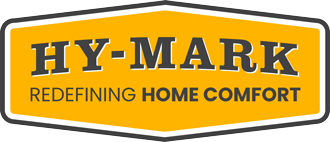You may not realize how “hard” your own water is until you visit a friend with “soft” water. You will notice how just a small amount of soap creates a rich lather, and how soft the towels are as you dry your hands. This is the result of a water softener at work.
Water softeners remove calcium and other dissolved mineral content from your water supply. Water is channeled through a reservoir filled with salt ions, where the hard mineral solids are contained and exchanged with the soft salt ions. The softened water evacuates the reservoir, leaving you with on-demand, conditioned water.
How Do I Know If I Have Hard Water?
Telltale signs of hard water include visible calcium buildup on your faucets and shower heads. You should look to see if there are floating particles in your water glasses when your ice cubes melt. You may also notice the colour of your clothing becoming less vibrant, and streaks on your dishes. Your hair may have become limp and dull, and your skin might be exhibiting signs of dryness.
If you’ve looked for these signs but you’re still not sure whether you need a water softener, consider having a water quality assessment. Hy-Mark offers free water testing to determine mineral content, as well as screen for any other contaminants in your water supply.
The reality of the situation is if you live in Southern Ontario and do not have a lake as your water source, it’s very likely that your water is quite hard. Much of the water we use is drawn through limestone aquifers deep in the ground and the dissolved calcium gets delivered as the water flows to the user. Although we are lucky to have an ample supply of high-quality clean water, the downside is it often is heavily mineral-laden.
Note also that water hardness can vary greatly even between nearby cities. For example, Kitchener typically shows a hardness level of 25 – 30 grains, while not far away in the town of Ayr there is a hardness count of 90 or above.
However, Toronto and other lakeside communities that take their water directly from natural soft water sources don’t usually need to condition their water in this way. They may have a need for other treatments such as iron and sulphur removal, though.
What Are The Benefits Of Softened Water?
Softened water is easier on pipes, so they will last longer without issue. Over time, areas with hard water see minerals build up along the internal walls of plumbing pipes. This constricts the flow of water and affects tap and shower water pressure. It also changes the internal pressure of your system, which can lead to leaks or breaks in the pipes. Cleaning or repairing pipes that have severe mineral build-up can be quite expensive, let alone dealing with cleaning up after a major leak. A water softener is a preventative solution that protects these problems from occurring.
Fixtures and appliances will have noticeably longer life-spans while functioning better with less maintenance. Many items we use daily such as washing machines and coffee makers are not manufactured to easily clean to descale mineral buildup. The effect of hard water on these items might not be readily apparent because the damage is internal, but it will eventually take its toll.
You can also get shinier hair and softer skin from using a water softener. Hard minerals won’t build up on the surface of the body to dull textures and strip it of natural oils. Your clothing will not wear out and fade in the laundry as quickly, saving you hundreds if not thousands of dollars on your wardrobe.
How Do I Maintain A Water Softener?
A water softener can be described as an interactive, low maintenance appliance. That is to say, it doesn’t need a lot of attention but does require human monitoring occasionally. Modern programming controls allow a plumber to do the setup and then create a “set it and forget it” situation for you. All you will need to do is refill the reservoir occasionally. The frequency this depends on your water consumption but is generally about 4 standard-sized bags of salt per year. Too little salt is ineffective but too much can lead to equipment failure due to “bridging” – the term used to describe the hardening of the salt within the tank when it is overfilled.
If you are interested in buying or renting a water softener, Hy-Mark can help.
